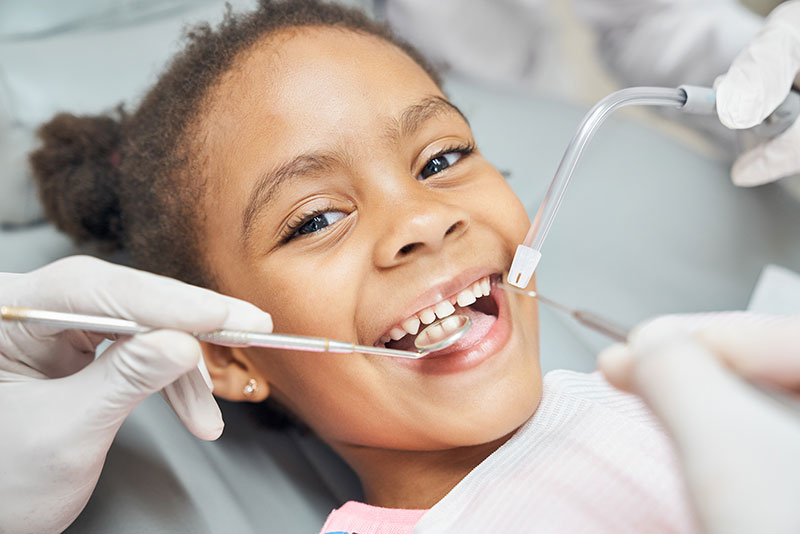What is a Pediatric Dentist?
At West Coast Dental, we make pediatric dental care fun and relaxing. Beside dental cleanings and exams, we provide simple instructions on proper dental care at home and offer a wide array of expert children’s dental services. After a visit to our office, you’ll have everything you need to ensure that your child’s beautiful smile lasts a lifetime.
The Importance of Regular Visits to a Pediatric Dentist
A pediatric dentist understands how to treat teeth that aren’t fully formed and how to keep baby teeth healthy. Often, dental issues treated in childhood can prevent more serious problems later on.
Checkups and Exams
Regular pediatric dental checkups and exams are vital for maintaining your child’s dental health.
- General cleaning: Your child’s pediatric dentist will use special cleaning tools to clean the surfaces of the teeth which includes removing plaque and tartar.
- Exam: The dentist will thoroughly inspect your child’s teeth, gums, neck and head. He or she will examine the development of your child’s teeth looking for signs of decay, crowding of teeth, gum disease and other child-specific dental problems.
- X-ray: This imaging technology allows the dentist to see what’s going on beneath the surface of your child’s teeth and gums. For added safety, we utilize digital X-rays that lower the radiation required by 75%.
- Dietary consultation: We will provide recommendations regarding diet and nutrition that will promote long-term dental health.
Preventative Dental Care
It’s important to establish good dental habits at a young age to prevent dental problems in adulthood.
- Good oral hygiene: At home, regular brushing and flossing are important steps for maintaining pediatric oral health. Take the lead in cleaning your child’s teeth. Then, when your child is old enough, provide supervision to ensure safe and effective hygiene.
- Baby bottle tooth decay: Avoid putting your child to bed or down for a nap with a sugary beverage in his or her bottle. This bathes the child’s teeth in sugar leading to a production of acids that cause decay.
- Mouth guard: Children who are active in sports and other recreation activities should get in the habit of wearing a mouth guard to protect their teeth and gums. Your pediatric dentist can create one that’s specifically designed to fit your child’s mouth.
Teen Braces
Dental braces apply mild, constant pressure to gradually move and straighten teeth. There are several types of braces available to suit the needs of your teen.
- Early orthodontic care: Early orthodontic consultation and treatment may help you shorten the time needed to straighten your teen’s teeth. We recommend that children see a pediatric orthodontist no later than age 7.
- Clear aligners: Clear aligners are a popular type of teen braces since they are nearly invisible and have little impact on daily life. This can help your teen to maintain his or her self-confidence.
- Clear braces: Clear braces are made of a clear, durable ceramic material that blends in with your teen’s natural smile.
- Retainers: Following the removal of your teen’s braces, he or she should wear a retainer regularly to prevent the teeth from shifting.
Other Pediatric Oral Treatments
Your child’s pediatric dentist offers a variety of other pediatric oral treatments to promote healthy teeth and gums including:
- Dental fillings: Dental cavities are the most common chronic disease in children and adolescents. If your child develops a cavity, the pediatric dentist will repair it with a permanent filling.
- Fluoride treatments: Topical fluoride treatments can help strengthen tooth enamel. These may be necessary if there’s not enough fluoride in your family’s water supply.
- Dental sealants: Sealants are designed to fill in deep crevices on the surface of the teeth to prevent the collection of food particles and eventual tooth decay. Dental sealants are fast, easy and painless.
First Pediatric Dental Care Visit
We know how important it is that children have a positive first impression of visiting the dentist. With dedication and patience, our children’s dental specialists take extra time to ensure the comfort and contentment of your child.
When Does Your Child Need Their First Visit
Children should start seeing a pediatric dentist within their first year of life. This should ideally occur when his or her first tooth appears.
What to Expect
Upon arrival, you’ll notice that our office features a children’s area specially created for fun. The first dental appointment is specially designed to help your child get comfortable with the dentist and to provide educational information about pediatric dental care. Our pediatric dental experts will explain everything to your child in words that are easily understood.
During the visit, the dentist will check your child’s teeth and gums. He or she may also perform a gentle cleaning.
What to Bring
Be sure to bring the following items to your child’s first pediatric dental care visit:
- Identification and dental insurance information
- A list of current medications
- A detailed medical history
- Payment to cover co-pays or children’s dental services not covered by your insurance
Preparing Your Child
Help your child understand why visiting the dentist is important for maintaining overall health. Try to get them excited about the experience. It may be helpful to schedule a morning appointment when your child is likely to be alert and cooperative.
Pediatric Dental Care at West Coast Dental
At West Coast Dental, we offer a full range of children’s dental services to protect the health of your child’s smile.
Team of Board-Certified Pediatric Dentists
Our board-certified pediatric dentists are specially trained to care for your child’s unique dental care needs. To find the best pediatric dentist near you, book an appointment today.
Same-Day Appointments
For your convenience, we offer same-day appointments in case you have an emergency situation that requires prompt care. Our emergency pediatric dentist will take care of your child’s teeth as quickly and safely as possible.
Insurance and Payment Options
We accept a wide range of dental insurance programs, and we offer special programs for patients without insurance. To ensure your child gets the early care he or she needs, we provide a number of flexible payment options.
We offer a variety of payment options to make your crown affordable. We also accept most dental insurance plans and have a dental discount program for patients without insurance. Call us at our toll-free number 888-329-8111 or make an appointment online here.




